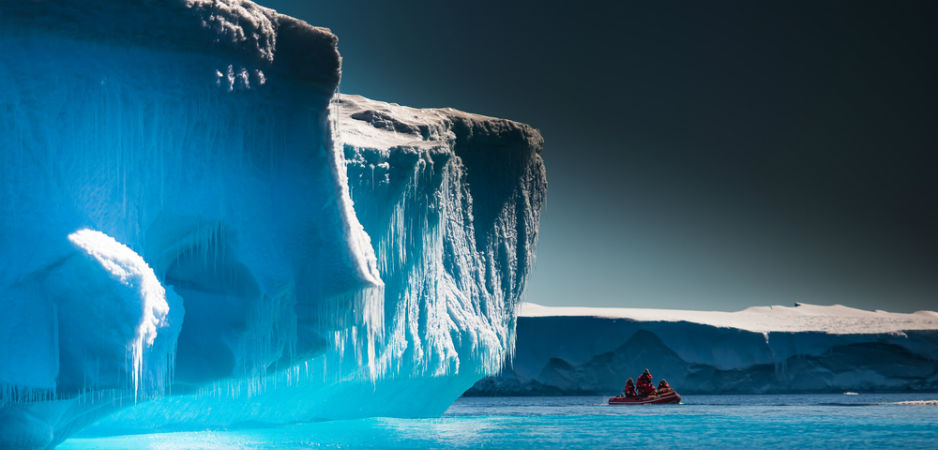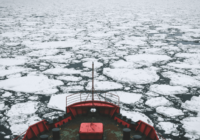Like in the Arctic, an overt race has begun for control of Antarctica’s rich resources.
People regularly confuse Antarctica with the Arctic, thinking that polar bears and penguins cross paths. The latter is an ocean surrounded by different islands with a permanent population of about 4 million. Antarctica is indeed surrounded by water, but it is the world’s highest, driest, windiest and coldest continent. However, some see climate change as an opportunity. Rapid ice loss enables ships to have access to Antarctica’s nutrient-rich waters. Polar resources there range from krill to oil and could soon be up for grabs if the Antarctic Treaty System fails to safeguard marine protected areas.
Antarctica faces dramatic, but largely unnoticed, geopolitical changes with tremendous implications for the continent. Like in the Arctic, an overt race has started. Russia and China have recently demonstrated that they are preparing to grab polar resources in Antarctica. The expansion of Sino-Russian capabilities in the region is agitating New Zealand and Australia to provide a military response. The current build-up of military and strategic capabilities in the region will soon put the Antarctic Treaty, which was signed in 1959 to preserve Antarctica and protect it from economic and political interests, to the test.
In 2018 China published its first white paper on its Arctic policy, demonstrating its support of the international legal regime and its recognition of the sovereignty of Arctic states, following up on its 2017 commitment to co-operation on and investment in Antarctic scientific projects and abiding by the treaty system. However, this “key foreign relations moment” received mixed responses from the eight Arctic states, and especially from Australia and New Zealand, who feel threatened by China’s expansionism.
As per Professor Anne-Marie Brady of Canterbury University in New Zealand, “China needs to clearly signal its intentions and strategic interests in the Antarctic, as other Antarctic states have done before them.” China’s use of underwater vehicles to search for gas hydrates and metallic nodules in the South China Sea is a stark example of what could soon be happening in Antarctica. The journey of the Chinese ice-breaker Haibing 722 in January 2017 was a clear sign that China wants to become a “polar great power,” especially in light of its investment in a Polar Silk Route in the Arctic. With four research stations, the fastest growing of the 53 signatories to the Antarctic Treaty has the presence and capabilities to assert a claim in the future.
China is not alone in the Great Antarctic Game. Russia, the great polar power of the north, has been in this region long before the Middle Kingdom. Now both of them are carving up the continent not only for the purpose of scientific research, but also for the future exploitation of its resources, including large mineral deposits. Unsurprisingly, Russia has repeatedly thwarted attempts to create a protected wildlife area in Antarctica, taking its time to commit to the Ross Sea sanctuary that China has signed up to earlier; along with Norway, the two nations have blocked an attempt to create the world’s largest marine reserve in the Weddell Sea last year.
Relying on Soviet-era bases, Russia is expanding activities in the region, from building runways and a rival to the American GPS system, to naval expeditions for the first time in 30 years. With its strategic position in the Arctic, Russia has set eyes on Antarctica to become a polar superpower.
Naval drills held jointly by China and Russia in the Baltic Sea and the Russian Far East region put to question the future of Sino-Russian relations. China has been relying on Russia’s already established capabilities in Antarctica to fuel its expansion. However, China has announced that it will soon begin to build its own permanent airfield to support its five research bases. China has the advantage of playing with neutrality to advance its agenda. Russia relies on its capabilities left over from Soviet times and its strategic geographical positioning in the Arctic.
China is navigating the situation in both the Arctic and Antarctica very smartly by creating economic and diplomatic alliances with Russia but avoiding an economic backlash by the West for doing so. Russia benefits from its strategic geographical position, and China wants to capitalize on that by bringing the cash. The strength of Chinese foreign policy comes from its neutral standpoint, which means that it can simultaneously engage with Russia, America or Europe without the pressure of having to take a side. Chinese diplomacy has shown so far to be collaborative and cooperative. But it would not be surprising if Beijing’s approach turns aggressive and provocative once China has firmly secured its airfield in Antarctica.
The Antarctic Treaty, which will be up for review in 2048, is of Cold War vintage and is falling apart as “the fight to own Antarctica” intensifies, with the competition for natural resources, research and tourism heating up. Scientists and diplomats increasingly fear that the current system will fail to safeguard Antarctica from growing economic and strategic competition. After US President Donald Trump pulled out of the Intermediate-Range Nuclear Forces Treaty, a new cold war could well be under way, played out in the polar regions.
New Zealand is also getting in on the game. In a recent report, Wellington declared its ambition to assert competing claims in Antarctica. “It is often not known,” said New Zealand’s Defense Minister Ron Mark, that its military’s “biggest deployment is to Antarctica, consisting of up to 220 personnel and different airlift platforms.” New Zealand has a pending claim on the Ross Sea, which is not only the most important access point to the continent, but also thought to possess one of the world’s largest oil reserves.
Both Australia and New Zealand worry that China’s military activities in Antarctica are upsetting the last 70 years of peaceful strategic balance in both Antarctica and Asia Pacific. They fear the rise of the Chinese dragon and its insatiable appetite for resources. As American allies they are the bulwarks against China, the new rising global power, and Russia, the formidable bear always hungry for more. The game of alliances seems to have started within the backdrop of a future international conflict. Which one will become the great polar superpower? This remains an open-ended question.
The views expressed in this article are the author’s own and do not necessarily reflect Fair Observer’s editorial policy.
Support Fair Observer
We rely on your support for our independence, diversity and quality.
For more than 10 years, Fair Observer has been free, fair and independent. No billionaire owns us, no advertisers control us. We are a reader-supported nonprofit. Unlike many other publications, we keep our content free for readers regardless of where they live or whether they can afford to pay. We have no paywalls and no ads.
In the post-truth era of fake news, echo chambers and filter bubbles, we publish a plurality of perspectives from around the world. Anyone can publish with us, but everyone goes through a rigorous editorial process. So, you get fact-checked, well-reasoned content instead of noise.
We publish 2,500+ voices from 90+ countries. We also conduct education and training programs
on subjects ranging from digital media and journalism to writing and critical thinking. This
doesn’t come cheap. Servers, editors, trainers and web developers cost
money.
Please consider supporting us on a regular basis as a recurring donor or a
sustaining member.
Will you support FO’s journalism?
We rely on your support for our independence, diversity and quality.





